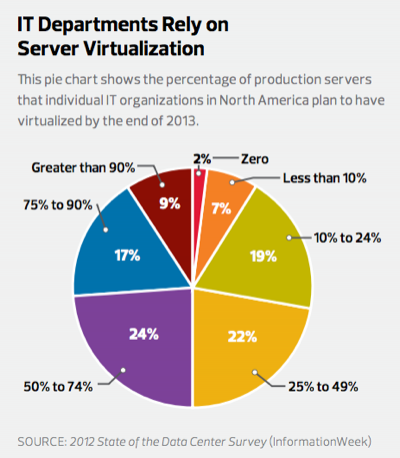Looking to Reduce IT Expenses?
 If you’re looking for ways to reduce IT expenses, a virtual server
is well worth consideration. A virtual server enables multiple
logical servers to share the same physical server hardware. What once
required multiple dedicated physical servers can now be accomplished on
a single physical machine. A Qantel customer might set up a virtual
server this way: one virtual machine runs Red Hat Enterprise Linux with
the QICWARE environment and another runs Windows and is the main Print
Connector machine. Other virtual machines would be your Windows file
server, your email server and your web server. If you’re looking for ways to reduce IT expenses, a virtual server
is well worth consideration. A virtual server enables multiple
logical servers to share the same physical server hardware. What once
required multiple dedicated physical servers can now be accomplished on
a single physical machine. A Qantel customer might set up a virtual
server this way: one virtual machine runs Red Hat Enterprise Linux with
the QICWARE environment and another runs Windows and is the main Print
Connector machine. Other virtual machines would be your Windows file
server, your email server and your web server.
Some reasons to consider moving to a virtual server:
Operating Costs
-
Server consolidation is one of the key benefits of moving to a virtual
server. Expenses to operate – electricity, cooling, maintenance – a
single server are likely less than what it takes to support several
smaller servers. Less physical space is required for a single server as
well.
Performance
-
A virtual server has greater system resources that are shared as needed
among the virtual machines. Each virtual machine can have memory,
processors, disk space, and other usage allocated to it. When allocated
resources are not being used and are needed by another virtual machine,
they can be shared on an as-available basis.
Efficiency
-
Hosting multiple virtual machines on a single physical server can boost
utilization of system resources to 50% or even 80%, while a typical
dedicated server may only be 5-10% utilized.
System Administration
-
With virtualization in place, system administrators are freed from
hardware support and can focus on other tasks. Virtualization can also
make software installation easier. Software vendors are trending toward
delivering their products preinstalled in virtual machines (also known
as virtual appliances), eliminating much of the traditional installation
and configuration work associated with software.
Increased Uptime
-
For some operations, uptime is the most significant benefit of
virtualization. A virtual machine can be taken down for service,
upgrade, or replacement without causing downtime in the others.
Backups & Data Redundancy
-
Best practice demands regular backups and redundancy to protecting
against data loss. Backups enable you to recover data, such as in the
event of deletion or corruption. Redundancy protects data against
failure in real time: each time data is written, it is stored in more
than one place.
If your business demands near 100-percent uptime, any additional
resources that may be required to achieve these benefits of
virtualization may well outweigh the cost:
-
Snapshots of each virtual machine
can be taken and uploaded to a backup server to
eliminate downtime required for daily backup.
-
In the case of a hardware failure (or
scheduled maintenance of the server hardware), all of
the virtual machines can “move” to another virtual
server “on the fly” and may not even be noticed by end
users.
-
Because the hardware for each
physical server does not to need to be in the same
location, failure due to a natural disaster is
mitigated. As an example, Qantel’s primary server is in
California, while its redundant server is in Illinois.
Qantel Technologies itself and a number of QICWARE customers have shifted
to virtual servers and are enjoying the benefits. Contact the
Qantel
Helpdesk or call us at 630.300.6997 with your questions about virtualization.
|
|
 If you’re looking for ways to reduce IT expenses, a virtual server
is well worth consideration. A virtual server enables multiple
logical servers to share the same physical server hardware. What once
required multiple dedicated physical servers can now be accomplished on
a single physical machine. A Qantel customer might set up a virtual
server this way: one virtual machine runs Red Hat Enterprise Linux with
the QICWARE environment and another runs Windows and is the main Print
Connector machine. Other virtual machines would be your Windows file
server, your email server and your web server.
If you’re looking for ways to reduce IT expenses, a virtual server
is well worth consideration. A virtual server enables multiple
logical servers to share the same physical server hardware. What once
required multiple dedicated physical servers can now be accomplished on
a single physical machine. A Qantel customer might set up a virtual
server this way: one virtual machine runs Red Hat Enterprise Linux with
the QICWARE environment and another runs Windows and is the main Print
Connector machine. Other virtual machines would be your Windows file
server, your email server and your web server. 